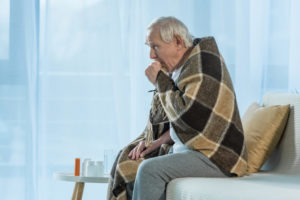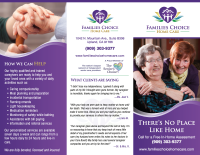With flu season underway, people need to start taking precautions to protect themselves. Measures like frequent hand washing, flu shots, and avoiding sick people can all help to keep you healthy. But sometimes, the flu still hits you full fledged.
This illness can create serious side effects. This especially holds true for senior citizens. One of the scariest effects of the flu is pneumonia.
Sometimes people start with walking pneumonia symptoms. Other times they get a full-fledged infection in their lungs. With senior citizens, even walking pneumonia can turn fatal fast, so recognizing the symptoms early on is crucial.
You need to know what to look for with your elderly loved ones. Family education can help protect them against serious illness.
Walking Pneumonia Vs. Pneumonia
First, let’s clarify the difference between walking pneumonia and pneumonia. They both can come from the same variety of causes.
Both refer to an infection of the lungs. But walking pneumonia, as the name suggests does not make you sick enough to keep you bedridden. Pneumonia, on the other hand, refers to a more serious version of the infection.
Types of Pneumonia
As mentioned above, pneumonia can come from a variety of causes. Over 30 infiltrates can lead to pneumonia.
Some of these causes include bacteria, viruses, mycoplasma, and molds. Two types of pneumonia typically come with the flu.
Influenza can indirectly lead to bacterial pneumonia. When the immune system weakens from the virus, opportunistic bacteria can attack the lungs.
Viral pneumonia can come directly from the bug that causes the flu. This occurs when it settles down into the lungs.
Pneumonia and Walking Pneumonia Symptoms
Let’s look at 5 symptoms of walking pneumonia and how they change when full-blown pneumonia comes into play.
1. Fever
Anytime you experience a fever, it signals an internal fight. What constitutes a fever?
For most people, their body keeps equilibrium around 98.6 degrees Fahrenheit. A temperature above 99 degrees Fahrenheit indicates something going awry in the body. Medical professionals consider this an elevated body temperature.
An elevated body temperature lets you know that the body’s defense system kicked in. It could happen from allergens or a viral or bacterial invasion.
When the core body temperature rises above 100.5 degrees Fahrenheit, we consider this a fever. Antibodies inside the host body release chemicals called pyrogens to tell the hypothalamus in the brain to raise the heat. This can prevent infections by signaling more white blood cells to join the battle, making an unfavorable environment for invaders and it can help kill some bacteria.
Though the body uses heat as a defense mechanism, fevers threaten the health of the individual, especially young children, and senior citizens. Even low fevers, such as those experienced during walking pneumonia, can lead to dehydration.
As the infection worsens and temperatures rise, the heat damages proteins within the host body. This can lead to delirium, convulsions, necrosis, and infarction.
Walking pneumonia symptoms typically include an elevated body temperature or low fever in senior citizens. A more serious pneumonia produces higher fevers.
2. Fatigue
When any infection sets in, your body revs up its workforce. It recruits extra white blood cells and triggers chemicals that affect your energy level. Even fever takes energy as it burns extra calories in the body.
In the elderly, walking pneumonia might leave them feeling tired as they go about their typical day. They may need an extra nap or earlier bedtime.
A full blown pneumonia infection will completely wipe a senior citizen out. They might sleep for the better part of the day when fighting this kind of infection.
Fatigue does not only interfere with daily activities. It creates a serious health risk to older patients by putting them at greater risk for falls. Falls can lead to life-threatening injuries due to frailer bodies.
3. A Cough
Classically, when you think of pneumonia, you probably picture a coughing person. The body is designed to keep anything foreign out of the respiratory tract. However, the type of cough produced can tell you more about the infection.
A person with walking pneumonia may present with a dryer, more sporadic cough. The weak infection annoys respiration, producing a cough to simply remove the invaders.
However, a more serious pneumonia will cause a more frequent, wet cough. This is because the more pronounced infection starts to create more sputum from the body’s increased production of protective lubricant and the development of pus from the infection.
Coughing can further the person’s exhaustion. For senior citizens, it also raises the risk of tiring out the muscles used for breathing.
4. Chest Pain
As mentioned earlier, pneumonia refers to an infection in the tissues of one or both lungs. This means that the microbes invade the tissue cells or feed on the nutrients in the flesh.
This causes open wounds on the lung and lots of inflammation. This alone causes pain.
Add in the fact that the person may have a hacking cough as well. Coughing requires several muscles including the abdominal muscle groups, the diaphragm, and the muscles between each rib.
Constantly exerting the muscles will leave anybody feeling sore. This holds especially true for senior citizens who do not work out or use their bodies in the same way as a younger counterpart.
Walking pneumonia may produce more of an aching or bruised feeling from a cough. Full blown pneumonia symptoms may include pleurisy, especially in an older patient, adding in a severe burning sensation and a heightened sense of pain.
5. Confusion
A change in mental status is always a cause for concern. In the elderly, who face more serious symptoms from infections, you may see mild disorientation to serious confusion and behavior change. Even the changes in the body caused by walking pneumonia can trigger this unique symptom in older people.
Pneumonia Treatment
Any form of pneumonia requires prompt treatment, especially for senior citizens. Symptoms can quickly escalate and turn deadly.
Treatment may include:
- antibiotics or antiviral drugs
- proper home care or hospitalization
- over the counter medications, such as Tylenol and cough syrup, to ease the symptoms
- steroids to open the airway
- oxygen if they experience trouble breathing
While full-blown pneumonia usually requires hospitalization for senior citizens, you may need to care for your loved one with walking pneumonia at home. Good home care means ensuring that they take all of the medications prescribed by the doctor. It also includes keeping them hydrated and protecting them the best you can against possible falls to reduce the risk of further problems.
Care For Your Elderly Loved Ones
Pay attention to any sudden physical or mental changes in a senior citizen. Even if they start to present with walking pneumonia symptoms, their weakened immune systems may not fight off the infection on their own for long. Also, some of the symptoms put them at risk for secondary injuries.
Part of caring for your loved ones means knowing when the time comes to seek extra help. If you want to ensure your loved one the best senior care possible, check out the services we offer.






